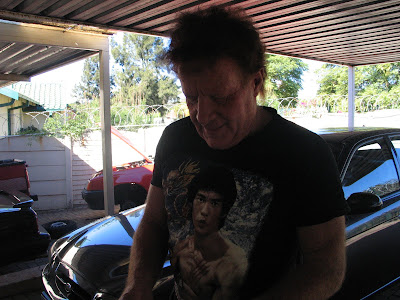Trasi Henen
Tuesday, January 15, 2013
Tuesday, March 27, 2012
In 2005 I used to teach an outreach drawing workshop at the Johannesburg Library.
I've held on to this drawing since then. Its done by Victor Hlongwane, he gave it to me because I liked it so much.
More to come...
Sunday, October 30, 2011
Saturday, August 6, 2011
TOKOLOSHE IN THE SUN
I'm interested in representations of persons or in this case mythical beings that exist mostly in public imagination and so reside in a kind of communal memory. So these elusive characters are then perpetuated and engendered through oral lore, literature and the media. What I find intriguing is comparing the illustrations/depictions of such beings/persons.
And in the spirit of tabloids The Daily Sun, South Africa's most widely read newspaper, has now become the vehicle for the portrayal of the evasive sex crazed demon, the Tokoloshe.
The Daily Sun is known for its explicit pictures of crime scenes. I've heard about their
photographers work ethic, that they are first on the scene, before the paramedics and the police. So they can get their picture... I've seen decapitated heads, hanging men, bullet riddled children, vigilante's victims. One image that really upset me and never left me was the cover picture of a dead women, face down, killed in a shooting. The photograph was taken at a low angle of her lying dead, with a view up her skirt. This paper is the definition of ABJECT.
So there are always stories of the malevolent Tokoloshe included in The Daily Sun, its perfect. Crime, sex, misfortune, torture, magic, death... a beguiling predator and serial rapist. The one who will never be caught.
Even though I have an ambivalence towards The Daily Sun, I find it interesting and maybe like that it has become the vehicle of The Tokolshe's public image, his PR. When I was a child I had to ask for descriptions of the demon. But here he is, twice a week (at least) featured in The Daily Sun.
Thursday, June 30, 2011
Monday, June 20, 2011
Avant-garde for beginners
This was included in 'One Million and Forty-Four years (and Sixty Three Days)' edited and compiled by Kathryn Smith | SMAC Gallery, 2007
I should've included that its also a font. peeeow
Wednesday, June 8, 2011
from the Cape Times, 22 November 2010
This was reported during a housing dispute in Hangberg (another article here), a settlement in Houtbay, that is located behind the Hout Bay harbor. Basically this was a reaction to a forced removal that was happening, link here.
Hout Bay is an interesting space, a microcosm of the disparate and dislocated nature of South African cities.
Hangberg is a marginalized fishing community comprised mostly of Cape Malay people, that has been residing on the side of the Sentinel Mountain for some thirty years. Izamo Yethu aka Mandela Park is an informal settlement, the residents here are from rural parts of South Africa and up north continent, Malawi, DRC, Zimbabwe, Zambia. Mandela Park sprawls the slopes of the Hout Bay valley... and has probably existed for about a decade.
Then you have the rest of Hout Bay, mostly upper middle class and super wealthy. Mr Sol Kerzner basically owns most of Leeukoppie mountain there, his estate looks directly on to Mandela Park.
The backdrop to this conflicted space is a picturesque, anything but urban valley on the periphery of the Atlantic.
Monday, May 23, 2011
OPENING BORDERS / OPENING OBJECTS
I recently participated in this research project opening borders opening objects. A MA research project that aims to explore the complex relationships between production, consumption and subjectivity.
I was asked to submit an image of a souvenir of mine, either bought or found. I chose my Namji Doll. I bought it from the Milnerton Market
It is interesting where the contemporary artist positions themselves within this complex exchange. Its almost impossible to avoid being a consumer, I guess what is important is what kind of consumer one chooses to be...
I was asked to submit an image of a souvenir of mine, either bought or found. I chose my Namji Doll. I bought it from the Milnerton Market
It is interesting where the contemporary artist positions themselves within this complex exchange. Its almost impossible to avoid being a consumer, I guess what is important is what kind of consumer one chooses to be...
Subscribe to:
Comments (Atom)


























